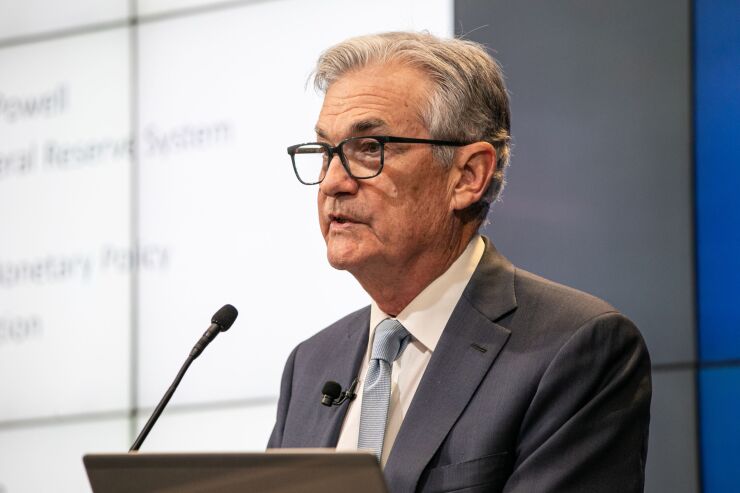WASHINGTON — After months of rapid hikes, the Federal Reserve is poised to slow its pace of rate increases during its next Federal Open Market Committee in two weeks.
In public remarks on Wednesday afternoon, Fed Chair Jerome Powell and Gov. Lisa Cook both said the central bank's benchmark interest rate must be increased to be sufficiently restrictive. But, both board members also acknowledged that monetary tightening already enacted this year could give the Fed some breathing room, even if significant improvements are not reflected in economic data.
"Monetary policy affects the economy and inflation with uncertain lags, and the full effects of our rapid tightening so far are yet to be felt. Thus, it makes sense to moderate the pace of our rate increases as we approach the level of restraint that will be sufficient to bring inflation down," Powell said during a speech at the Brookings Institution in Washington. "The time for moderating the pace of rate increases may come as soon as the December meeting."

Since March, the Fed has increased its target interest rates by 3.75 percentage points to 4% on the high end. It has raised rates by three-quarters of a percent after each of the past four FOMC meetings, a rate of increase not seen since the 1980s.
Powell added during a question-and-answer session following his remarks that while the FOMC may raise rates less precipitously as early as its December meeting because it is concerned that it might raise rates higher than necessary to tame inflation, it also wants to avoid having to cut rates sooner than necessary.
"One risk management technique is to go slower and feel our way a little bit to what we think is the right level," Powell said. "Another is to hold on longer at a high level and not loosen policy too early. My colleagues and I do not want to overtighten because ... cutting rates is not something we want to do soon. So that's why we're slowing down."
Cook, who spoke at an event hosted by the Detroit Economic Club, also said the Fed would be wise to move a bit more cautiously considering the rapid policy initiatives already underway.

"Given the tightening already in the pipeline, I am mindful that monetary policy works with long lags. Thus, as we get closer to that uncertain destination, it would be prudent to move in smaller steps."
A slower rate of increase has been widely projected by market participants since the last FOMC meeting on November 2. During a press conference following that meeting, Powell noted that the Fed could adopt a slower pace of rate increases in December or in the following meeting on Jan. 31 and Feb. 1.
Over the summer, the Fed also began shrinking its balance sheet over the summer by allowing Treasuries and mortgage-backed securities to mature without being replaced, a move that makes monetary policy even more restrictive. Powell said that the Fed is being cautious in its strategy to draw down its balance sheet, but will ultimately stop that drawdown at a point that is much higher than the Fed's balance sheet has been historically because ample reserves provide the financial system with added liquidity and stability.
"We're not looking to really go back into proving that [reserves are] scarce because what happens is ... the demand for reserves is not stable," Powell said. "It can move up and down very substantially. So we want to stop at a place that's safe. You know, having a lot of reserves in the system is really a good thing. It's really a public benefit to have plenty of reserves and plenty of liquidity in the markets and in the banking system and in the financial system."
In the FOMC's last summary of economic projections, which was released in September, 12 out of 19 participants — Fed governors and regional bank presidents — projected interest rates would peak between 4.63% and 5.12%. In his remarks Wednesday, Powell said he expected the Fed will have to raise rates beyond that level in order to make monetary policy sufficiently restrictive.
"Given our progress in tightening policy, the timing of that moderation is far less significant than the questions of how much further we will need to raise rates to control inflation, and the length of time it will be necessary to hold policy at a restrictive level," Powell said. "It is likely that restoring price stability will require holding policy at a restrictive level for some time."





